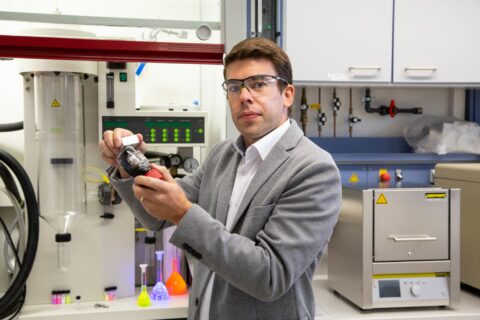ERC Consolidator Grant for Prof. Dr. Karl Mandel
Prof. Dr. Karl Mandel has received an ERC Consolidator Grant.
Karl Mandel has been Professor for Inorganic Chemistry at FAU since 2020, and Head of the Particle Technology Group at the Fraunhofer Institute of Silicate Research ISC in Würzburg since 2014. He completed his doctoral degree in 2013 at Julius-Maximilians-Universität Würzburg. His research interests lie in the production of supraparticles with new and unexpected properties and their use as intelligent objects that can make a contribution to sustainability.
The ERC Consolidator Grant entails two million euros in funding over a funding period of five years.
Wants to make material speak: Prof. Dr. Karl Mandel
Materials have to withstand a lot: They are faced with environmental factors such as heat, cold or moisture, mechanical forces are exerted on them and during their manufacture it has to be ensured that the various steps in the process were successful, for example that compound materials are stuck together reliably. Inspection processes aimed at screening materials are expensive and complex. This is one reason why components are often replaced as a precaution or products simply discarded instead of being recycled, despite the fact that they might have still been able to be used.
Karl Mandel, Professor of Anorganic Chemistry at FAU and Head of Particle Technology at Fraunhofer Institute for Silicate Research ISC in Würzburg hopes to change that. He wants to functionalize matter in such a way that it can tell its history. “Materials and components should be made able to perceive, record and inform us of environmental stimuli, across the whole of their life cycle,” he explains.
At the core of his vision are supraparticles just several micrometers in size consisting of two central components: magnetic signal transmitters based on iron oxide, in other words basically rust, and non-magnetic sensitizers. “If the individual sensitizers undergo any specific changes due to environmental stimuli such as temperature, moisture or mechanical strain, this leads to a change in the structure of all the supraparticles, which in turn affects the magnetic interactions of the components responsible for transmitting signals,” explains Mandel. “We want to read the magnetic signals and see how this correlates quantitatively with the environmental stimuli.” As a simple example, Mandel mentions table salt, whose structure degrades upon contact with water and which could act as an indicator of moisture when used in conjunction with iron oxide.
Karl Mandel hopes to transfer the principle of “smart rust” to various areas: a comprehensive, destruction-free inspection of materials could simplify predictive maintenance. In recycling processes, it would be easier to decide whether materials can be recycled and used again or if they should be discarded. The procedure could also make an important contribution to the Industrial Internet of Things, as the magnetic pattern could indicate whether processes have been executed correctly and the functionality of the components guaranteed. The special feature of all these scenarios is that the information can be accessed from within the materials themselves, from areas that have remained hidden from scrutiny until now.

